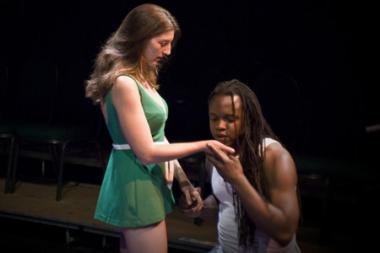The Greek myth of Orpheus and Eurydice is one of the great tragic love stories, as much a part of our collective unconscious as Romeo and Juliet’s. Lovers so deeply connected that when she dies, he follows her to the Underworld and sings his plea so beautifully that the king of Hades grants his wish to release her, on one condition: Don’t look back as you leave, or you’ll lose her forever. Of course, he does. And the question, of course, is why.
Sarah Ruhl’s answer in Eurydice is unorthodox, and typical of her quirky, semi-surreal plays. It arises from one of her themes: the seductiveness of death, the relief the soul can feel when washed in the river of forgetfulness and freed of earthly cares and complications. In this version, the river Lethe also scours away all memory of language. The play is thus concerned also with the power and fragility of words and the hazy membranes that ease or block our attempts at communication. It also reverses the story’s usual focus, from Orpheus’s pilgrimage to Eurydice’s Underworld experience.
In Amy B. Davis’s spare set for Linda McInerney’s production, eerily lit by Lara Dubin, the river flows in strands of blue and red neon that snake across the stage. Aerial artist Fiona Lowry, twisting on long strips of white fabric suspended from the lighting grid, embodies symbolic moments in the play. The production is full of invention, whimsy and flashes of beauty. But it seems wrong-footed at almost every turn.
Kerry Kazokas and Richard James are attractive young performers who have a sweet rapport, but their inexperience shows from the start. While Kazokas is fresh and appealing as Eurydice, she can’t reach the emotional energy needed to carry the title role. And I couldn’t feel the depth of Orpheus’ loss and yearning—nor his status as the world’s most inspired musician (though James does have a heavenly singing voice).
There’s an Alice in Wonderland quality to Eurydice’s encounters in the Underworld, but McInerney pushes the whimsy so hard it crashes. Bill Stewart is allowed to burlesque his dual role as the arch seducer who sends Eurydice to her death and the petulant child who is, in fact, the lord of the Underworld. There’s also a trio of Stones, a chorus of women who serve as a kind of neighborhood watch committee to enforce Hades’ peculiar rules. Maureen McElligott, Sarah Wilson and Beth Wojtusik are done up as tattered clowns (by costumer Athan Vennell) whose shrill antics make them seem like demonic Munchkins.
The play’s most intriguing relationship is between Eurydice and her father, a longtime denizen of Hades. He’s a subversive who remembers how to read and write and helps his newly dead daughter back to memory. Michael Haley gives a gruff tenderness to the role, and these scenes find a quiet beauty.
The show is full of lovely visual moments: Eurydice’s fatal fall breathtakingly enacted; her arrival in Hades in an elevator that rains; a house created from string. Paula Kimper has provided snatches of evocative transitional music. But most of the play’s poignant and comic interactions are overblown or overdeliberate, and Eurydice’s life in death becomes a scattering of interesting but uncohesive moments.
Eurydice: through July 18, Old Deerfield Productions, Reid Theatre, Deerfield Academy, Deerfield, (413) 559-7678, olddeerfieldproductions.org.



